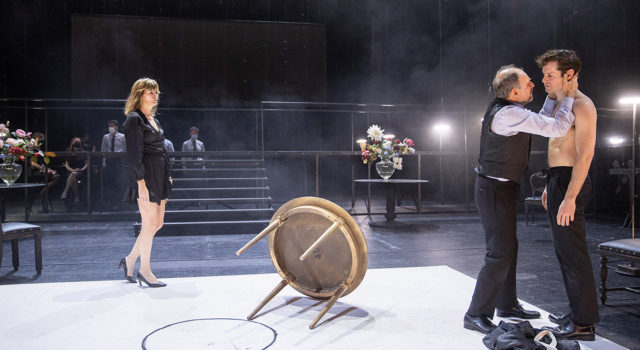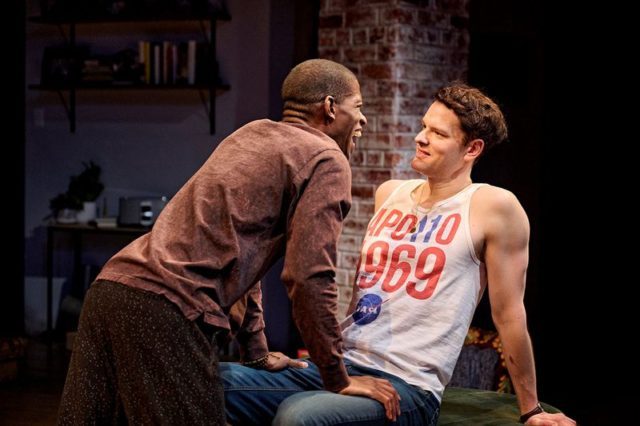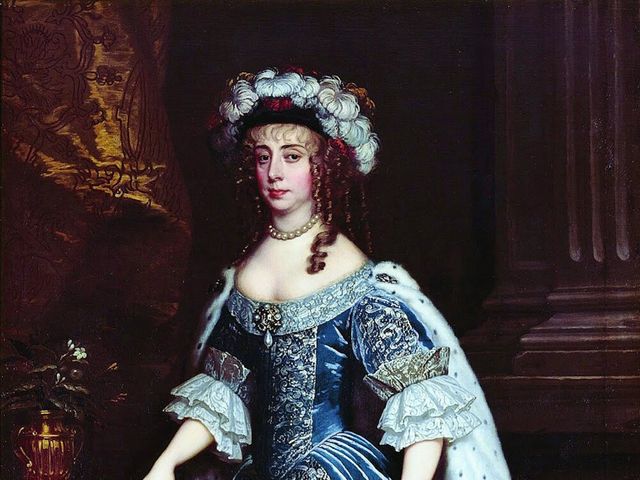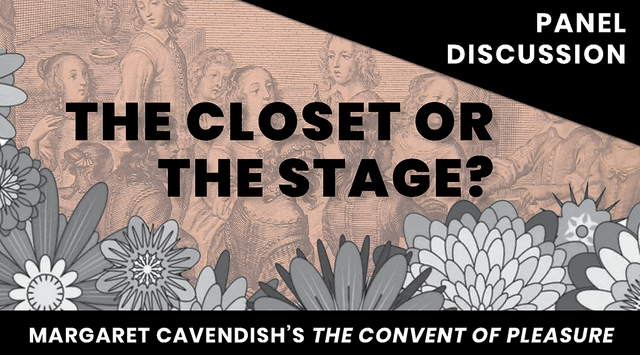
John Douglas Thompson is extraordinary as Shylock in TFANA production of The Merchant of Venice (photo by Henry Grossman)
THE MERCHANT OF VENICE
Theatre for a New Audience, Polonsky Shakespeare Center
262 Ashland Pl. between Lafayette Ave. & Fulton St.
Through March 6, $75-$85
866-811-4111
www.tfana.org
Arin Arbus reimagines a Merchant of Venice for this moment in time in her ingenious adaptation of the Bard’s challenging tragedy, continuing through March 6 at TFANA’s Polonsky Shakespeare Center. A coproduction with DC’s Shakespeare Theatre Company, the play is Arbus’s fourth collaboration with classical treasure John Douglas Thompson, following Macbeth, Othello, Ibsen’s A Doll’s House, and Strindberg’s The Father. Thompson is heart-wrenching as Shylock, the first professional Black actor to play the role in New York City since Ira Aldridge in the 1820s.
When the lights go out, the full ensemble comes out in regular dress, signaling they are performers, not the characters they are about to portray. A moment later the show begins, with the cast in contemporary costumes by Emily Rebholz — blazers, jeans, sneakers, gym clothes, suits. Riccardo Hernandez’s set is an imposing faux marble wall and steps, with a large black hole in the upper center, as if the sun and moon are both gone. The characters enter and leave through two doors, the wings, or the aisles, almost as if they’re part of the audience.
In order to woo the wealthy, beautiful heiress Portia (Isabel Arraiza), the noble Bassanio (Sanjit De Silva) asks his close friend, Venetian merchant Antonio (Alfredo Narciso), to borrow three thousand ducats from respectable Jewish moneylender Shylock. Shylock is tired of being mocked because of his religion, and he lets Antonio know it. He tells the brash Antonio, “Many a time and oft / In the Rialto you have rated me / About my moneys and my usances: / Still have I borne it with a patient shrug, / For sufferance is the badge of all our tribe. / You call me misbeliever, cut-throat dog, / And spit upon my Jewish gaberdine, / And all for use of that which is mine own. / Well then, it now appears you need my help: / Go to, then; you come to me, and you say / ‘Shylock, we would have moneys:’ you say so; / You, that did void your rheum upon my beard / And foot me as you spurn a stranger cur / Over your threshold: moneys is your suit / What should I say to you? Should I not say / ‘Hath a dog money? is it possible / A cur can lend three thousand ducats?’ Or / Shall I bend low and in a bondman’s key, / With bated breath and whispering humbleness, Say this; / ‘Fair sir, you spit on me on Wednesday last; / You spurn’d me such a day; another time / You call’d me dog; and for these courtesies / I’ll lend you thus much moneys’?”

Portia (Isabel Arraiza) works out with her servant Balthazar (Jeff Biehl) in The Merchant of Venice (photo © Gerry Goodstein)
It’s a powerful speech that sets the stage for the relationship between Shylock and the others; he is clearly well educated and eloquent, but despite his passionate entreaty, the Christians treat him with scorn and disdain. Antonio needs to obtain the money for Bassanio, but he cannot help but still belittle Shylock.
“I am as like to call thee so again, / To spit on thee again, to spurn thee too,” he tells him. “If thou wilt lend this money, lend it not / As to thy friends; for when did friendship take / A breed for barren metal of his friend? / But lend it rather to thine enemy, / Who, if he break, thou mayst with better face / Exact the penalty.”
The penalty is a harsh one: Instead of charging Antonio interest, Shylock says he will take a pound of Antonio’s flesh if he doesn’t return the three thousand ducats in three months’ time. Certain that his merchant ships will come back successfully a month before the agreement ends, Antonio signs the contract.
Antonio and Bassiano are often accompanied by their sycophantic bros: snarky, sunglasses-wearing, cocktail-swilling yuppie Gratiano (Haynes Thigpen), who is funny until he isn’t; Solanio (Yonatan Gebeyehu) and Salerio (Graham Winton); and Lorenzo (David Lee Huynh), who wants to elope with Shylock’s daughter, Jessica (Danaya Esperanza), and convert her to Christianity to further her father’s shame. In addition, Shylock’s servant, the goofy Lancelot Gobbo (Nate Miller), who wears his jeans very low, quits his job with the moneylender and moves on to Bassiano. “For I am a Jew, if I serve the Jew any longer,” Lancelot says.
Meanwhile, two suitors beat Bassanio to try to win Portia’s hand. First Prince Morocco (Maurice Jones), then Prince of Aragon (Varín Ayala), must choose wisely among three caskets, one of which holds the key to Portia’s heart — and fortune. On the gold one is inscribed, “Who chooseth me shall gain what many men desire,” on the silver “Who chooseth me shall get as much as he deserves,” and on the lead “’Who chooseth me must give and hazard all he hath.”
Portia is attended by her servant Balthazar (Jeff Biehl) and her maid, Nerissa (Shirine Babb); the latter is supremely efficient, while the former offers comic relief, flirting hysterically with many of the men he meets and, when Portia asks for music, uses his iPhone. (The sound and original music is by Justin Ellington.)

Shylock (John Douglas Thompson) demands a pound of flesh from Antonio (Alfredo Narciso) in Shakespeare tragedy (photo © Gerry Goodstein)
It all leads up to one of the great trial scenes in all of theater, a brutal battle of wits in which Shylock, who is suing Antonio for his pound of flesh, represents not only Jews and Blacks, both of whom have histories of being enslaved and discriminated against up to the present day, but, in essence, all of humanity who have suffered hatred and oppression at the hands of tyrants and bigots.
Throughout its four-century existence, The Merchant of Venice has likely been performed by troupes that glorified anti-Semitism and was cheered on by audiences that agreed with Antonio and his friends’ views of Jews, as well as by companies and audiences that had deep sympathy for Shylock’s plight. But Arbus achieves something different.
The casting is diverse but not random; by having Shylock and Jessica portrayed by Black actors, Arbus is making a powerful statement, particularly in the socioeconomic reckoning that has taken hold in the wake of the police murder of George Floyd. With his gentle cracked whisper of a hoarse voice that comes from deep in his soul, the British-born Thompson (Jitney, The Iceman Cometh) is unforgettable as Shylock, not merely following in the footsteps of Laurence Olivier, F. Murray Abraham, George C. Scott, Al Pacino, Jonathan Pryce, and Patrick Stewart but making the role his own.
When Shylock, who is repeatedly referred to as a dog, a villain, a cur, and the devil, asks, “If you prick us, do we not bleed? / If you tickle us, do we not laugh? / If you poison us, do we not die? / And if you wrong us, shall we not revenge?” Thompson is speaking for all the downtrodden; Shakespeare’s words echo down the ages: Sojourner Truth’s “Ain’t I a Woman?” speech leaps to mind as well. When Shylock tells the court, “Proceed to judgment: by my soul I swear / There is no power in the tongue of man / To alter me: I stay here on my bond,” Thompson speaks for all who resist injustice.
Arraiza shines as Portia, whether working out, dressed in an elegant gown with stiletto heels, or disguised as a learned doctor. Arbus ratchets up the homoeroticism by having Bassanio and Antonio be very good friends, while Biehl practically waves the Gay Pride flag as Balthazar. As serious as the subject matter is, Arbus includes plenty of fun and good humor; Biehl and Miller in particular often make vocal and gestural asides that are hilarious and certainly not in the original script.
“The quality of mercy is not strained, / It droppeth as the gentle rain from heaven / Upon the place beneath. It is twice blest: / It blesseth him that gives and him that takes,” Portia says in Act 4. We are blessed to have such a thrilling production of this dark tragedy; if only all were blessed equally with mercy in these dark times.













